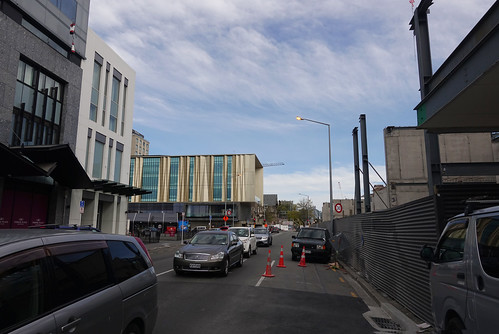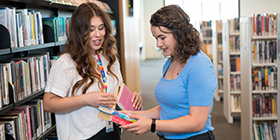The first in a series of posts that looks at the history of the central Christchurch sites on which your new library, Tūranga, has been built.

Imagine you are peeking through Tūranga's ground floor window on the corner of Gloucester and Colombo, possibly drooling over all the yummies in Foundation Café... insert TIMEY WIMEY STUFF...
You are now back in 1855 on the very same spot and are again drooling, this time over all the yummies in Gee & Co.'s bakery and confectionery.
Thomas Gee was a biscuit maker from Lambeth who arrived in 1851. He quickly established a business in Lyttelton selling "bride cakes, jellies, blanc-manges, patties...and ginger beer"and later a shop on the corner of Gloucester and Colombo. In 1855 the Christchurch store was transferred to his son-in-law William Stringer who continued to sell baked goods but also diversified into booze. He applied for a license to sell wine and beer in 1857 and by 1860 his business was known as Stringer's Hotel.
In 1860 Stringer's Hotel license was passed to George Henry Tribe who renamed the premises the Central Hotel.
By 1872 mine genial host was Edward Hiorns, opens a new window. Edward originally hailed from Warwickshire and arrived in Christchurch during the 1860s, marrying Amelia Heighton in August 1868. He was heavily involved in the community both as a member of the Christchurch City Council, and later the Linwood Borough Council, and as a Freemason. He must have found the hotel trade financially advantageous as he was able to buy Linwood House, a very fine residence built in 1857 for Joseph Brittan.
In August 1897 architect Joseph C Maddison , opens a new windowwas retained by Edward Hiorns to draw up a plan for a new section to the Central Hotel. In brick and stucco the new hotel had 30 rooms, and two shops on the ground floor one of which had frontage on both Colombo and Gloucester. The main entrance was on Gloucester Street with a private and public bar on the ground floor, dining room overlooking Colombo Street on the first floor and bedrooms and bathrooms, with hot and cold water and showers, on the second.
The Cyclopedia of New Zealand in 1903 had a delightful puff-piece where the hotel was described as an “ornament to the street architecture of Christchurch” , opens a new windowand as being “furnished throughout with luxury and excellent taste.”
The hotel was renamed The Masonic and the license was transferred to William James, then E. Carroll.
The Masonic Hotel was the scene of a "Strange Death" in 1912. Loyal Stawell Cherry, opens a new window (yes, that was his name) fell 6 feet from his bedroom window to a recess while feverish with influenza. His cries alerted staff who returned him to bed and sent for medical assistance but the Hobart-native died 30 minutes later.
One of the most memorable businesses to lease shop space in the rebuilt Masonic Hotel was Montague's Corner. Owned by the exotically named Israel Montague, Montague's Corner sold fancy goods and toys. Fancy goods, I'm reliably informed are "items (as novelties, accessories, or notions) that are primarily ornamental or designed to appeal to taste or fancy rather than essential" but I'm sure the major draw was the underground toy cave.
Bankrupted back in the 1880s when he owned his own fancy goods business in Strange's Building, Israel then spent 22 years at the D.I.C. (Drapery and General Importing Company of New Zealand Ltd) before opening up again on his own in August 1906.
Israel fell foul of the law several times for breaching the Shop and Offices Act by staying open outside the prescribed hours but hey, fancy goods don't sell themselves!
Israel died in 1936 and is buried in the Jewish cemetery at Linwood. His wife Ada, daughter of Simeon Isaacs, former President of the Jewish Congregation of Dunedin, had predeceased him by many years.
Montague's Toy Cave and fancy goods was replaced by J R McKenzie's. Modelled on America's five and dime stores, John Robert Hugh McKenzie eventually owned over 70 stores throughout New Zealand and employed over 1800 staff. John McKenzie was also well known in horsey circles owning Roydon Lodge Stud on Yaldhurst Road. Throughout his lifetime McKenzie gave generously to charities and was actively involved in Rotary. he later set up the J R McKenzie Youth Education Fund , opens a new windowand the J R McKenzie Trust, opens a new window, both of which still operate today.
The Masonic Hotel went through several modifications and licensees. Alfred William Wells and his wife Eva owned and ran the Masonic for many years. Alfred died in 1961 leaving Eva a generous annuity and the rest of his estate including the freehold of the Masonic in trust for up to 21 years. The Church of England bought the hotel, and on Saturday 12th of September 1981 the Masonic Hotel closed its doors for the last time and was shortly after demolished.
Construction started on a new seven storey building in early 1982. Completed in November 1982 it included a basement car park, offices and ground floor retail.
A variety of businesses populated this space over the years most recently an internet café and Mum's 24 café and restaurant with its awesome replica/fake food displays.
And so, we end up back where we started, peering in at a café window.
It's good to know that Tūranga's café and Lego play area (not exactly a "toy cave" but close enough) are just an extension of a long history of businesses and institutions that have brought life and activity to this particular corner of the central city.
Next week: Hobbs' Corner
Further reading
- Our pages about Early Christchurch
- About Tūranga, Christchurch's central library
- Browse Local History resources











Add a comment to: Before Tūranga – The Masonic Hotel and Montague’s Corner